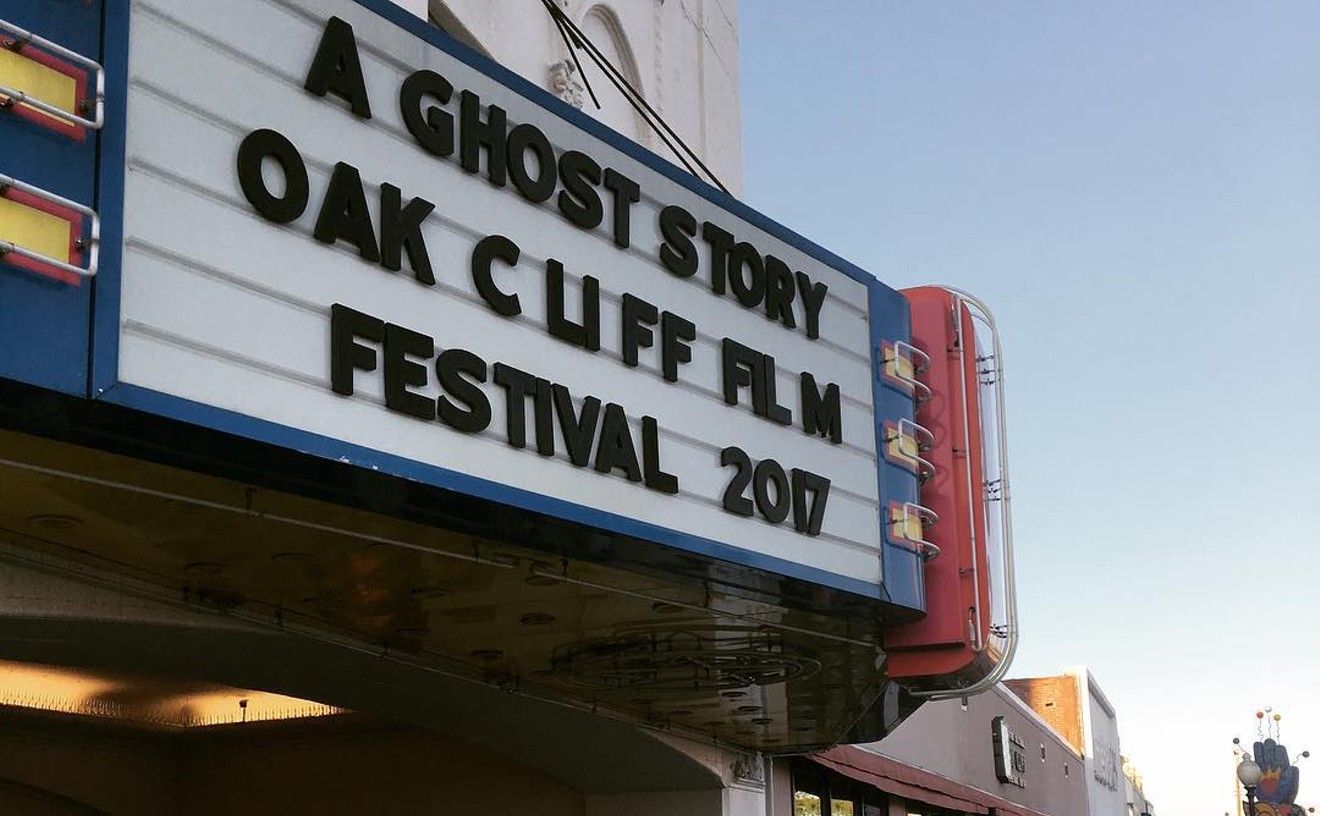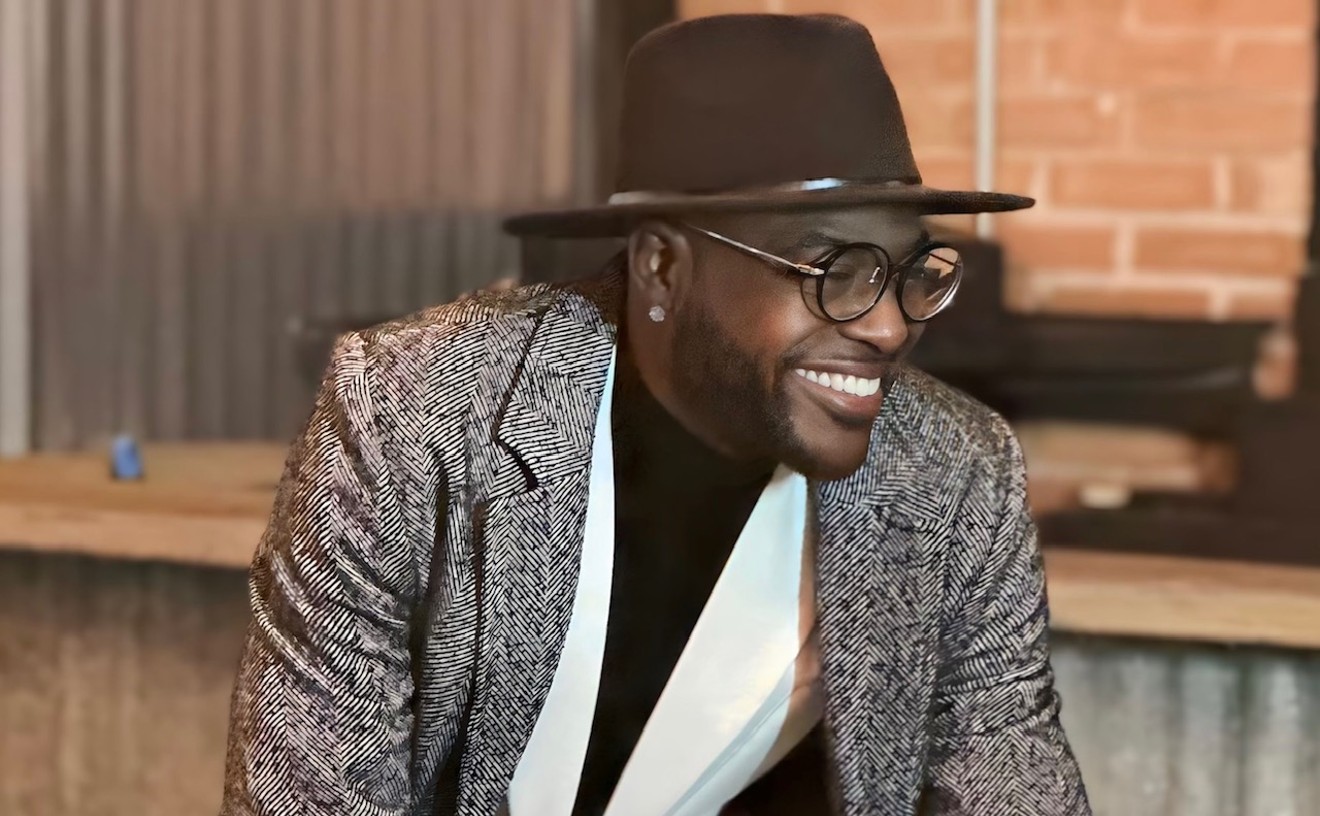In no time at all, he's 100 feet from where he just was, heading toward the chain-link fence separating the sweaty masses from the football field at Midwestern State University, where, moments before, the Dallas Cowboys finished their afternoon workout.
"We can talk over here," Jones says, popping the top off a black felt-tip pen as he moves his stocky, white-haired legs forward, always forward.
Over here, as it turns out, is at the edge of the frenzied throng, the passionate and the downright nutty who have come out to cheer Jerry's Team during nothing more than a mere practice. Jones--smiling as always, his face red with heat and delight--scribbles his name on anything the fans give him: footballs, caps, shirts, napkins, you name it.
"We love you, Jerry!" they scream. "Jerry! JERRY!"
He just keeps on smiling and signing for a good 30 minutes, till almost 7 p.m. last Sunday, even as his players--fullback Daryl "Moose" Johnston and just-turned-coach Bill Bates among them--drive by on their golf carts, ignoring the persistent pleas for a little attention.
What's even more astonishing is that Jones does indeed hold a conversation over the hootin' and hollerin'. Hell, he's more coherent than usual--maybe the badgering of the crowd forces him to concentrate on his answer a little more, or maybe he's just showing off.
Or maybe it's the question itself: What does he think about the assertion of some Cowboys, former and current, that head coach Chan Gailey is, well, Jerry Jones' very own Tom Landry?
He smiles at first, then tries to ignore the question by yelling something at wide receiver Macey Brooks, who's walking off the field.
No, honestly, Jerry--think about it. With the Denver Broncos, Gailey was a student of Dan Reeves, the very Dan Reeves who spent 15-plus years as a player and coach under Landry. Both Gailey and Landry use, as the cornerstones of their offenses, multiple formations and a lot of movement in the backfield. They're both notorious disciplinarians.
And Landry and Gailey both love Jesus and the shotgun formation.
Seriously, Jerry. Seriously.
"What I see is a coaching style that pays attention to detail," he begins, tentatively. "There are similarities in that Landry and Chan have coached both sides of the ball. The other thing is...Well, I don't know how much Coach Landry called the plays. I know he did for several years, and Chan will be calling the plays. In a lot of ways, he has some of the same types of attributes Landry has."
Such as?
"The key thing is that he's a guy who's fundamentally sound. He believes in the running game and has that imaginative streak. In the sense that Coach Landry has that legacy, I appreciate that. Certainly I do. Coach Reeves was a Super Bowl coach, Coach Landry is obviously Coach Landry, and those are impressive credentials."
And with that, he smiles, then turns his attention full-on toward the waiting, sweating faithful who want the signature of the most famous owner in all of professional sports.
The notion that Chan Gailey is Tom Landry stuffed into the body of a Georgia peach is, of course, ridiculous: Gailey, who was essentially fired by Reeves after the Broncos failed to win the Super Bowl in 1990, has yet to win even a scrimmage as the Cowboys' fourth head coach. He is only one week into his first training camp, and the season will be long and unforgiving; no amount of preseason hype will mean squat come September 6.
But Gailey is as close as Jones has gotten to Landry in the decade he has owned this team. Long gone is the arrogant fascism of Jimmy Johnson, who is still convinced he won those Super Bowls. Barry Switzer's wacky, mental-breakdown puppet show is back in Oklahoma, never again allowed to cross the Red River.
Gailey's the boss now, running training camp like some bastard hybrid between pee-wee football and Marine boot camp. He's hands-on and born-again, giving players Sunday mornings off for church and then running them through hellacious drills on Sunday afternoon, scolding and encouraging all at once.
He's thoughtful during afternoon press conferences and quick to point out when someone's being un-Christian: During one, he took issue with an Oklahoma reporter who suggested that a season-ending injury to cornerback Wendell Davis wasn't so bad, because ol' Wendell was just a longshot backup anyway. Gailey's Jimmy without the chip on his shoulder; he's the anti-Barry.
If nothing else, Gailey is the last step on the Cowboys' road to recovery--if not from a 6-10 season, then from a tarnished image of bad boys running amok and crybaby millionaires insisting their failure was the coach's fault.
Former Cowboys fullback Robert Newhouse--best known during the 1970s as the guy who couldn't be tackled because of his compact size and thick legs--says that Gailey's training camp resembles much of what he recalls during his days playing for Tom Landry. Newhouse, now the Cowboys' director of players assistance and development, watches players run their penalty laps after practice, and the memories of Landry's own punishing camps come flooding back.
"I remember the penalty-lap days and why they existed," says Newhouse, the Cowboys' second-round pick in 1972. "I was even listening to some of the play calls--the signals, the movement, the counts--and I can see a lot of what we did back when I was playing."
To Newhouse--who, along with Calvin Hill, was brought in by Jones to help keep the players in line during the days when a few Cowboys were snorting up the 20-yard-line--training camp is less about conditioning than it is about how to play as a cohesive unit. It's where players find out whom they can trust between the hash marks; it's where rookies become men, where veterans become boys, and where last year's losers beat themselves into believing they're this year's champions. Newhouse says there's no comparing Switzer's and Gailey's camps: The difference, he says, is "night and day."
"People have their own opinions of last year," Newhouse says. "I think it was just the attitude of the players. Now, there's a lot of reasons players have attitudes, let's face it. I mean, it could be the system or whatever. But there was a lot of disarray at the top. Barry delegated authority to his assistants, and they couldn't get the best out of the players. Why not? Well, we could talk all day about why not. But now, I see a lot of respect and a lot of discipline and a lot of concentration. Everybody's thinking about football and getting the job done."
So why in God's name did it take so long?
Jones rode out the 1997 season with Barry because Jerry believed in him, right up to the final seconds of the 20-7 home loss against the New York Giants on December 21. Jones was deranged enough to believe that Barry and the Boys were somehow going to turn the Titanic right-side-up and sail it into Port Qualcomm in San Diego. He says so even now.
"The reason I didn't make a change before the end of last season was, we were winnin' Super Bowls," he says, grinning like he always does before he gets going. "Seriously. Let's just take the four years with Switzer. We were in the championship, quarters away from going to the Super Bowl. The next year, we win the Super Bowl. The next year, we're in the playoff game with the next stop being the championship game. I didn't see anything that said we needed to make a change.
"We were changing--we changed different personnel and different things, and obviously circumstances changed with people retiring [Charles Haley and Jay Novacek] and getting injured. After we got beat by Carolina [in the divisional playoff game on January 5, 1997], I thought, 'Well, I wonder if the score would have been different if Michael Irvin, Leon Lett, a healthier Emmitt Smith, and Deion Sanders had been on the field.'
"Now, had I known the kind of year we were gonna have last year, if I roll the clock back, in hindsight you might wanna make a change. But going into last year, I didn't think we needed to make a change."
Jones talks about being "very disappointed" with the 1997 season, but insists he did not see the world collapsing around him with the same clarity bestowed upon everyone else in the rational world. As far as he was concerned, the Cowboys were in the playoff hunt even after the humiliating 28-point loss to Green Bay on November 23 and the 27-14 debacle against the Tennessee Oilers on Thanksgiving Day--two of the final five defeats that would close the book on the Bootlegger's Boy in Dallas. Bless him--Jones is blinded by either giddy optimism or utter madness. Or both. With him, it's a fine line.
"If we win the last two or three games, we're in the hunt, we go to the playoffs, we got Aikman and a team that's three games away from a Super Bowl, and we know how to get there, because we've done it," he says. "I didn't see being locked out of the dance till we were locked out, and I didn't accept it. I didn't feel it goin' on during the year, but after it was over with, I looked back, and I said, 'How in the world?'"
His search for Switzer's replacement took months, and it was all a tease. He paraded Terry Donahue, George Seifert, and Sherman Lewis before the media like a man running a shell game--pick a card, any card, and it will be the wrong one. In the end, he hired Gailey--former offensive coordinator with the Pittsburgh Steelers and the Denver Broncos, and a man who was exiled from the National Football League during the early '90s, coaching in the World League and at something called Samford University.
Jones says the process of finding and hiring a head coach was more difficult than his decision to buy the team; one more buddy hire, and Jones would forever be a laughingstock. "I worked harder on it than buying the football team, because I wanted to do a good job," he says. "My experience in hiring the head football coach, up until last year, was easy. If they were a teammate of mine, they got the job."
He laughs, then gets in his golf cart and drives off into the sunset. For now, Jerry has God on his side.










